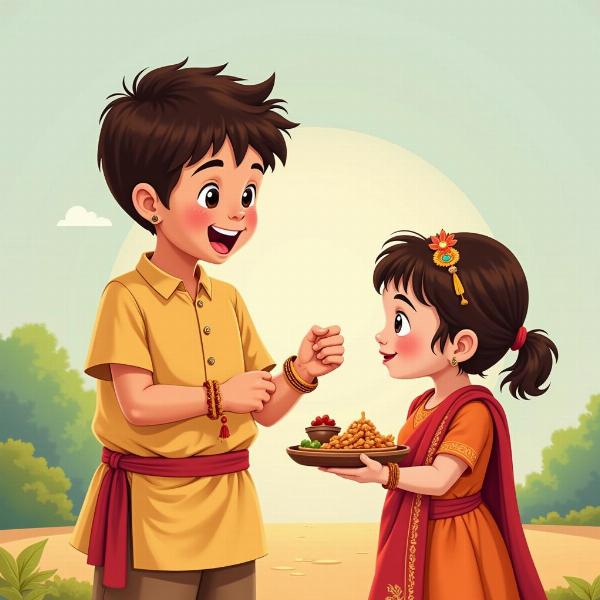Understanding the nuances of familial relationships is crucial to grasping the cultural fabric of India. The term “older brother” carries deep significance, encompassing respect, responsibility, and affection. This article delves into the various ways to say “older brother” in Hindi, exploring the cultural context and significance behind these terms. Knowing the correct term to use not only demonstrates linguistic proficiency but also cultural sensitivity, fostering stronger connections with Hindi speakers.
Exploring the Different Terms for Older Brother in Hindi
Hindi, like many Indian languages, offers multiple terms for “older brother,” each reflecting subtle differences in nuance and relationship dynamics. These distinctions are important, showcasing the depth and richness of the language. Let’s explore some of the most common and important terms:
- Bhaiya (भैया): This is perhaps the most widely used and versatile term. It’s a respectful and affectionate way to address an older brother. It’s suitable for both formal and informal settings and transcends regional variations.
- Bhai (भाई): While technically meaning “brother,” it can also be used for an older brother, especially in informal settings or among close friends. However, using “bhaiya” is generally preferred to show respect to an elder sibling.
- Dada (दादा): This term is primarily used in some regions of India, particularly in Maharashtra and Gujarat. It’s a term of endearment and respect, similar to “bhaiya.”
- Agraja (अग्रज): This is a more formal and literary term for “older brother.” It is less commonly used in everyday conversation but can be found in literature and religious texts. You may want to use this term when discussing familial relationships in a more academic context.
 Older brother celebrating Raksha Bandhan with his sister
Older brother celebrating Raksha Bandhan with his sister
Cultural Significance of the Older Brother in India
The role of the older brother in Indian families extends beyond simply being a sibling. They are often seen as protectors, mentors, and role models. This responsibility is deeply ingrained in Indian culture and is reflected in various traditions and rituals. For example, during Raksha Bandhan, sisters tie a rakhi (sacred thread) around their brother’s wrist, symbolizing their love and his pledge to protect her. This ritual underscores the significance of the brother-sister bond and the older brother’s protective role.
How to Choose the Right Term
The appropriate term to use depends on several factors, including regional variations, the level of formality, and the emotional closeness of the relationship. Using “bhaiya” is generally a safe and respectful choice in most situations. However, understanding the regional variations and nuances of each term can help you communicate more effectively and build stronger relationships.
Expert Insight:
- Dr. Anjali Sharma, a sociologist specializing in Indian family dynamics, says: “The various terms for ‘older brother’ in Hindi highlight the complexity and depth of familial relationships in Indian culture. These nuances reflect the importance of respect, hierarchy, and emotional connection within the family unit.”
Why Knowing “Older Brother Meaning in Hindi” Is Important
Understanding the cultural context of words like “older brother” is essential for anyone seeking to immerse themselves in the Indian language and culture. It allows for more meaningful interactions and demonstrates respect for the cultural values of India. Whether you’re learning Hindi for personal or professional reasons, mastering these familial terms is a vital step towards cultural fluency.
Conclusion
“Older brother meaning in Hindi” encompasses much more than just a simple translation. It embodies the cultural values of respect, responsibility, and love that are deeply embedded in Indian family dynamics. By understanding and using the appropriate terms like “bhaiya,” “bhai,” “dada,” and “agraja,” you can navigate social interactions with greater sensitivity and build stronger connections with Hindi speakers.
FAQ
- What is the most common way to say “older brother” in Hindi? Bhaiya (भैया) is the most common and generally accepted term.
- Is it okay to use “bhai” for an older brother? While acceptable in informal settings, bhaiya is generally preferred to show respect.
- What does “dada” mean? “Dada” is used in some regions like Maharashtra and Gujarat as a term of endearment for an older brother.
- When should I use “agraja”? “Agraja” is a more formal and literary term, suitable for academic or formal contexts.
- Why is it important to know these different terms? Using the right term demonstrates cultural sensitivity and strengthens communication with Hindi speakers.
Related Articles
Meaning-Hindi.in is your premier source for professional Hindi translation services. We specialize in business, legal, technical, website, educational, and specialized translations, offering fast and accurate services to meet your needs. Our expert linguists are deeply versed in Indian culture and language, ensuring culturally sensitive and accurate translations. Contact us today for all your Hindi translation needs! Email: [email protected], Phone: +91 11-4502-7584. Let Meaning-Hindi.in bridge the language gap for you.